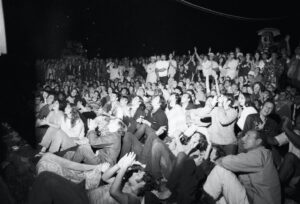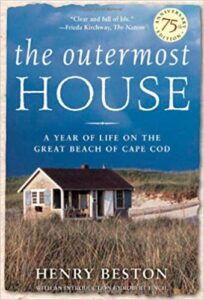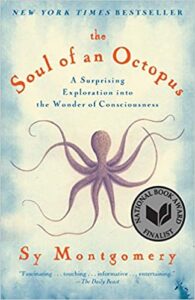“The brilliant host of On Being…”
July 20, 2021Inspired.
“We are apparently swimming in a reality unfolding moment by moment. The truly good news is that we are together. . . all forms of us.” -Pari Center, Italy, participant
Krista Tippett:
“We are living in a post 2020 world…for the rest of our lives.”
__
Anand Giridharadas is a journalist and writer. He is a former columnist and foreign correspondent for The New York Timesand a visiting scholar at the Arthur L. Carter Journalism Institute at New York University. He is the author of India Calling, The True American, and Winners Take All: The Elite Charade of Changing the World.
From Anand, 7.20.21:
“…got me thinking back to a conversation I once had with Krista Tippett, the brilliant host of On Being. And so today, on Billionaire Space Day No. 2, I share with you this brief reflection about the background ethos of the age…”
July 21, 1969, New York, New York: Rain-soaked New Yorkers watch TV and cheer as they see Apollo 11 astronaut Neil Armstrong’s first step on the lunar surface (Getty)
The.Ink
What we do alone and what we do together
On the billionaire space race
This is a story, in some ways, about two rival faiths. A faith in what we do alone versus a faith in what we do together.
These are two parallel and rival spiritual orientations. They are both very strong parts of our culture.
One tradition inspires the celebration of a heroic soloist, capitalist, pull-yourselves-up-by-the-bootstraps story.
But that’s never been the only story. We’ve also always had this story of movements. It wasn’t individuals who got rid of the King of England. The most important things we’ve done in this culture have been together.
These two tendencies, what we do alone and what we do together, have always vied for primacy in American life. For much of the 20th century, they lived in a certain healthy tension. And right now the relationship between them is very unhealthy. It’s become a relationship of mutual annihilation, instead of a relationship of adversarial cooperation.
I think we need to get back to a place where we understand both and celebrate both the very real heritage we have in this country of doing things alone and of doing things together, and the relationship that those things have.
Because at our best, we do things together in a way that allows people to do things alone. And people do things alone in a way that creates the opportunities to do things together. These things don’t have to be at war with each other, but they are absolutely at war today.
__
2018:
“This is a challenging conversation but a generative one: about the implicit moral equations behind a notion like “win-win” — and the moral compromises in a cultural consensus we’ve reached, without reflecting on it, about what and who can save us.’
We Americans revere the creation of wealth. Anand Giridharadas wants us to examine this and how it shapes our life together. This is a challenging conversation but a generative one: about the implicit moral equations behind a notion like “win-win” — and the moral compromises in a cultural consensus we’ve reached, without reflecting on it, about what and who can save us.” -On Being
From Krista Tippett on Twitter:
“…a lovely reflection, honored to be cited.”
Octopus Garden
Sy Montgomery, book recommendations:
Well, one of them I quoted from earlier. And that is “The Outermost House” by Henry Beston. There’s a quote from that book that is kind of the motto that I use when I write all my books. It says,
‘We need another and a wiser and perhaps more mystical concept of animals, for “the animals shall not be measured by man. … They are not brethren, they are not underlings. They are other nations caught with ourselves in the net of life and time, fellow prisoners of the splendor and travail of the Earth.”’
Ezra Klein
That’s beautiful, by the way.
From NYTimes columnist and podcast host Ezra Klein:
I’ve spent the past few months on an octopus kick. In that, I don’t seem to be alone. Octopuses (it’s incorrect to say “octopi,” to my despair) are having a moment: There are award-winning books, documentaries and even science fiction about them. I suspect it’s the same hunger that leaves many of us yearning to know aliens: How do radically different minds work? What is it like to be a truly different being living in a similar world? The flying objects above remain unidentified. But the incomprehensible objects below do not. We are starting to be smart enough to ask the question: How smart are octopuses? And what are their lives like?
Sy Montgomery is a naturalist and the author of dozens of books on animals. In 2015 she published the dazzling book “The Soul of an Octopus,” which became a finalist for the National Book Award in nonfiction. It’s an investigation not only into the lives and minds of octopuses but also into the relationships they can and do have with human beings.
This was one of those conversations that are hard to describe, but it was a joy to have. Montgomery writes and speaks with an appropriate sense of wonder about the world around us and the other animals that inhabit it. This is a conversation about octopuses, of course, but it’s also about us: our minds, our relationship with the natural world, what we see and what we’ve learned to stop seeing. It will leave you looking at the water — and maybe at yourself — differently.
Book recommendations:
The Outermost House by Henry Beston
The Old Way by Elizabeth Marshall Thomas
King Solomon’s Ring by Konrad Lorenz
__
Podcast link: https://www.nytimes.com/2021/07/13/opinion/ezra-klein-podcast-sy-montgomery.html
This, Ezra first:
And so it’s this idea that, oh, isn’t it interesting, octos have this completely different kind of cognition than we do and maybe think with their tentacles, and not with what we would think of initially as their brain. And we would never do that, but what a fascinating thing. Well, maybe we do do some version — a smaller version, probably — but of that. And then that’s probably true across a lot of these different pieces — that we, in fearing anthropomorphizing, we under-represent or refuse to admit how much we’re also animals, and have more animal forms of cognition than the post- Enlightenment rationalism that we tend to emphasize.
Sy Montgomery:
Bingo, Ezra, you got it. That’s absolutely right. We have been blinded to the genius of not only fellow animals, but fellow people for the longest time, just because we think everything has to be just like us. We didn’t even recognize the symptoms of heart attack in women because we were too busy focusing on men, because the doctors were all men for so long, for example.
So absolutely, I think that is the biggest mistake we are making in the world. And we’re not just making it in underestimating animals, but we underestimate fellow human beings as well.
NETFLIX:
A filmmaker forges an unusual friendship with an octopus living in a South African kelp forest, learning as the animal shares the mysteries of her world.
AP NEWS:
“My Octopus Teacher,” the tale of an eight-limbed creature and her human companion, has won the Oscar for best documentary.
The lifespan of a female octopus of the kind Foster met extends to only about 18 months. But that was enough time for him and his fellow directors Pippa Ehrlich and James Reed to be profoundly impacted by her.
“This really is a tiny personal story that played out in a sea forest at the very top of Africa. But, on a more universal level, I hope that it provided a glimpse of a different kind of relationship between human beings and the natural world,” Ehrlich said on the telecast.
Foster has said his relationship with the octopus taught him about life’s fragility and our connection with nature, and even helped him become a better father.
Reed thanked Foster at the ceremony, saying: “He kind of showed us if a man can form a friendship with an octopus, it does sort of make you wonder what else is possible.”
Under the sea
In an octopus’ garden
In the shade
And swim about
The coral that lies
Beneath the waves…
♡


